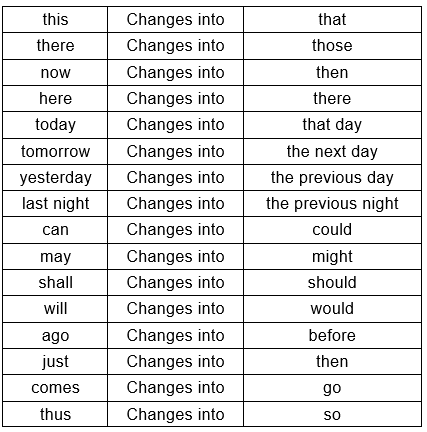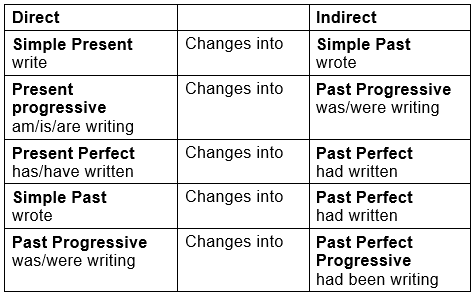Direct & Indirect Speech | English Grammar Advanced - Class 10 PDF Download
Direct and Indirect Speech

Speech can be reported in two ways: Direct Speech and Indirect Speech.
Direct Speech involves quoting the exact words spoken by a person, while Indirect Speech means summarizing what was said without using the exact words.
- Example of Direct Speech: Sohan said to Mohan, “I am going to school.”
- Example of Indirect Speech: Sohan told Mohan that he was going to school.
1. Reporting Clause and Reported Speech:
In the sentence "Sohan told Mohan that he was going to school," the part before the inverted commas is called the reporting clause, and the verb 'said' is the reporting verb. The words spoken by Sohan, which are enclosed in inverted commas, are known as the reported speech.
2. Rules for Changing Direct Speech into Indirect Speech:
- In Indirect Speech, inverted commas are not used.
- The conjunctions that, if, and whether are typically used after the reporting verb.
- The first word of the reported speech starts with a capital letter.
- The tense of the reporting verb remains unchanged.
- The reporting verb adjusts according to the meaning: it may be told, asked, or inquired.
3. Rules for the Change of Pronouns:
- The first person pronouns (I, me, my, we, us, our) in the reported speech change according to the subject of the reporting verb.
- The second person pronouns (you, your, yourself) in the reported speech change according to the object of the reporting verb.
- The third person pronouns do not change.
For example:
- He said, “I like the book.” He said that he liked the book.
- He said to me, “Do you like the book?” He asked me if I liked the book.
- He said, “He likes the book.” He said that he liked the book.
4. Changes in Words Expressing Nearness, Time, Auxiliaries, etc.
5. Change in Tenses:
- If the reporting verb is in the present or the future tense, the tense of the reported speech does not change:
- Satish says, “I am flying a kite.” Satish says that he is flying a kite.
- Satish will say, “I want a glass of milk.” Satish will say that he wants a glass of milk.
- If the reporting verb is in the past tense, then the tense of the reported speech will change as follows:

- If the direct speech expresses a historical fact, universal truth, or habitual fact, then the tense of the direct speech will remain unchanged:
- Direct: He said, “Honesty is the best policy.” Indirect: He said that honesty is the best policy.
- Direct: He said, “The sun rises in the east.” Indirect: He said that the sun rises in the east.
6. Changing Statements into Indirect Speech:
- The reporting verb ‘said to’ is changed to ‘told’, ‘replied’, or ‘remarked’.
- If the reporting verb is not followed by an object, it remains unchanged.
- The inverted commas are removed, and the conjunction 'that' is commonly used to link the reporting clause with the reported speech.
The rules for the change of pronouns, tenses, etc., are followed.
- Direct: Ramu said, “I saw a lion in the forest.” Indirect: Ramu said that he had seen a lion in the forest.
- Direct: Satish said to me, “I am very happy here.” Indirect: Satish told me that he was very happy there.
- Direct: He said, “I can do this work.” Indirect: He said that he could do that work.
- Direct: Renu said to me, “I was washing the clothes.” Indirect: Renu told me that she had been washing the clothes.
- Direct: She said, “I am not well.” Indirect: She said that she was not well.
- Direct: He said to Sita, “I have passed the test.” Indirect: He told Sita that he had passed the test.
- Direct:. said to my friend, “He has been working very hard.” Indirect:. told my friend that he had been working very hard.
- Direct: My friend said to me, “I shall go to Delhi tomorrow.” Indirect: My friend told me that he would go to Delhi the next day.
- Direct:. said, “I agree to what he said.” Indirect:. said that I agreed to what he had said.
- Direct: The student said to the teacher, “I am sorry that I am late.” Indirect: The student told the teacher that he was sorry that he was late.
Rules for Changing Interrogative Sentences into Indirect Speech
- When changing interrogative sentences into indirect speech, the reporting verb "said" is changed to "ask" or "inquire."
- The interrogative sentence is transformed into a statement by placing the subject before the verb and ending with a full stop, while keeping the question format in the reported speech.
- If the interrogative sentence contains a wh-word (such as who, when, where, how, why, etc.), the wh-word is repeated in the sentence, functioning as a conjunction.
- For yes-no type interrogative sentences, the conjunction "if" or "whether" is used.
- The auxiliaries do, does, and did in a positive question are omitted in reported speech.
- The conjunction is not used after the reporting clause.
Examples:
- Direct:. said to him, “Where are you going?” Indirect:. asked him where he was going.
- Direct: He said to me, “Will you go there?” Indirect: He asked me if I would go there.
- Direct: My friend said to Deepak, “Have you ever been to Agra?” Indirect: My friend asked Deepak if he had ever been to Agra.
- Direct:. said to him, “Did you enjoy the movie?” Indirect:. asked him if he had enjoyed the movie.
- Direct:. said to her, “Do you know him?” Indirect:. asked her if she knew him.
Changing Commands and Requests into Indirect Speech
- In imperative sentences with commands, the reporting verb is changed to command, order, tell, allow, request, etc.
- The imperative mood changes to the infinitive mood by adding ‘to’ before the verb. In negative sentences, ‘do’ is omitted and ‘to’ is placed after ‘not’.
- Direct: She said to me, “Open the window.” Indirect: She ordered me to open the window.
- Direct: The captain said to the soldiers, “Attack the enemy.” Indirect: The captain commanded the soldiers to attack the enemy.
- Direct:. said to him, “Leave this place at once.” Indirect:. told him to leave that place at once.
- Direct: The teacher said to the students, “Listen to me attentively.” Indirect: The teacher asked the students to listen to him attentively.
- Direct: The Principal said to the peon, “Ring the bell.” Indirect: The Principal ordered the peon to ring the bell.
 |
Test: Reported Speech - 1
|
Start Test |
Sentences with ‘Let’
(i) ‘Let’ is used for making a proposal. Change the reporting verb to proposed or suggested and use ‘should’ instead of ‘let’.
- Example: Direct: He said to me, “Let us go home.” Indirect: He suggested to me that we should go home.
(ii) ‘Let’ is used as ‘to allow’. Change the reporting verb to requested or ordered in indirect speech. Start reported speech with ‘to’.
- Direct: Ram said to Mohan, “Let him do it.” Indirect: Ram ordered Mohan to let him do it. Or Ram told Mohan that he might be allowed to do that.
Sentences with Question Tags
(i) In indirect speech, the question tag is usually omitted. (ii) In indirect speech, these words are removed and the phrase “respectfully” is misleading in this context. Direct: Mahesh said, “Sir, may I go home?” Indirect: Mahesh asked his sir if he might go home.
Sentences with ‘Yes’ or ‘No’
(i) When 'Yes' or 'No' is used to hide a complete sentence, change it into a short answer. (ii) In indirect speech, 'Yes' or 'No' is replaced with the appropriate short answer.
Examples:
Direct: He said, “Can you dance?” And I said, “No.” Indirect: He asked me if I could dance, and I replied that I couldn’t. Direct: My mother said, “Will you come home on time?” And I said, “Yes.” Indirect: My mother asked me if I would come home on time, and I replied that I would.
 |
Download the notes
Direct & Indirect Speech
|
Download as PDF |
Sentences with ‘have to’ or ‘had to’
(i) In indirect speech, change ‘have to’ according to the rules. (ii) Change ‘had to’ to ‘had had to’ in the indirect speech.
Examples:
Direct: Hari said, “I have to work a lot.” Indirect: Hari said that he had to work a lot. Direct: Hari said, “I had to work a lot.” Indirect: Hari said that he had had to work a lot.
|
54 videos|155 docs|40 tests
|
FAQs on Direct & Indirect Speech - English Grammar Advanced - Class 10
| 1. What is direct speech? |  |
| 2. What is indirect speech? |  |
| 3. How do you change a sentence from direct to indirect speech? |  |
| 4. When do we use direct speech? |  |
| 5. What are the punctuation rules for direct and indirect speech? |  |




























